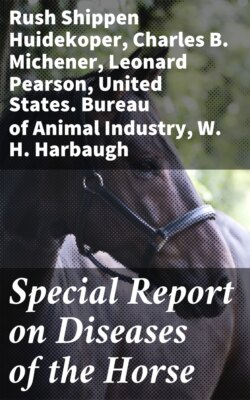Читать книгу Special Report on Diseases of the Horse - Charles B. Michener - Страница 54
На сайте Литреса книга снята с продажи.
DIARRHEA.
ОглавлениеDiarrhea is due to indigestion or intestinal catarrh or to irritation of the bowels from eating moldy or musty feed, drinking stagnant water, diseased condition of the teeth, eating irritating substances, to being kept on low, marshy pastures, and to exposure during cold nights, or in low, damp stables. Some horses are predisposed to scour and are called "washy" by horsemen; they are those with long bodies, long legs, and narrow, flat sides. Horses of this build are almost sure to scour if fed or watered immediately before being put to work. Fast or road work, of course, aggravates this trouble. Diarrhea may exist as a complication of other diseases, as pneumonia and influenza, for instance, and again during the diseases of the liver.
The symptoms are the frequent evacuations of liquid stools, with or without pronounced abdominal pain, loss of appetite, emaciation, etc.
Treatment is at times very simple, but requires the utmost care and judgment. If due to faulty feed or water it is sufficient to change these. If it results from some irritant in the intestines this is best gotten rid of by the administration of an oleaginous purge, for which nothing is better than castor oil, although raw linseed oil may be used if the case is not severe. The diarrhea often disappears with the cessation of the operation of the medicine. If, however, purging continues it may be checked by giving wheat flour in water, starch water, white-oak bark tea, chalk, opium, or half-dram doses of sulphuric acid in one-half pint of water twice or thrice daily. Good results follow the use of powdered opium 2 drams and subnitrate of bismuth 1 ounce, repeated three times a day. In all cases it should be remembered to look to the water and feed the horse is receiving. If either of these is at fault it is at once to be discontinued. We should feed sparingly of good, easily digested feeds. With that peculiar build of nervous horses that scour on the road but little can be done as a rule. They should be watered and fed as long as possible before going on a drive. If there is much flatulency accompanying diarrhea baking soda or other alkaline medicines may effect a cure, while if the discharges have a very disagreeable odor it may be corrected by 1 ounce of sulphite of soda or dram doses of creolin in water, repeated twice a day. Be slow to resort to either the vegetable or mineral astringents, since the majority of cases will yield to change of feed and water or the administration of oils. Afterwards feed upon wheat-flour gruel or other light feeds. The body should be warmly clothed.
Superpurgation.—This is the designation of that diarrhea, or flux from the bowels, that, at times, is induced by and follows the action of a physic. It is accompanied with much irritation or even inflammation of the bowels and is always of a serious character. Although in rare instances it follows from a usual dose of physic and where every precaution has been taken, it is most likely to result under the following circumstances: Too large a dose of physic; giving physics to horses suffering from pneumonia, influenza, or other debilitating diseases; riding or driving a horse when purging; exposure or drafts of cold air; or giving large quantities of cold water while the physic is operating. There is always danger of superpurgation if a physic is given to a horse suffering from diseases of the respiratory organs. Small and often-repeated physics are also to be avoided, as they produce debility and great depression of the system and predispose to this disorder. When a physic is to be given one should rest the horse and give him sloppy feed until the medicine begins to operate; clothe the body with a warm blanket; keep out of drafts; give only warm water in small quantities. After a horse has purged from twelve to twenty-four hours it can mostly be stopped, or "set," as horsemen say, by feeding on dry oats and hay. Should the purging continue, however, it is best treated by giving demulcent drinks—linseed tea and oatmeal or wheat-flour gruel. After this the astringents spoken of for diarrhea may be given. Besides this the horse is to receive brandy in doses of from 2 to 4 ounces, with milk and eggs, four or five times a day.
Laminitis ("founder") is a frequent sequel of superpurgation and is to be guarded against by removing the shoes and standing the horse on moist sawdust or some similar bedding.
